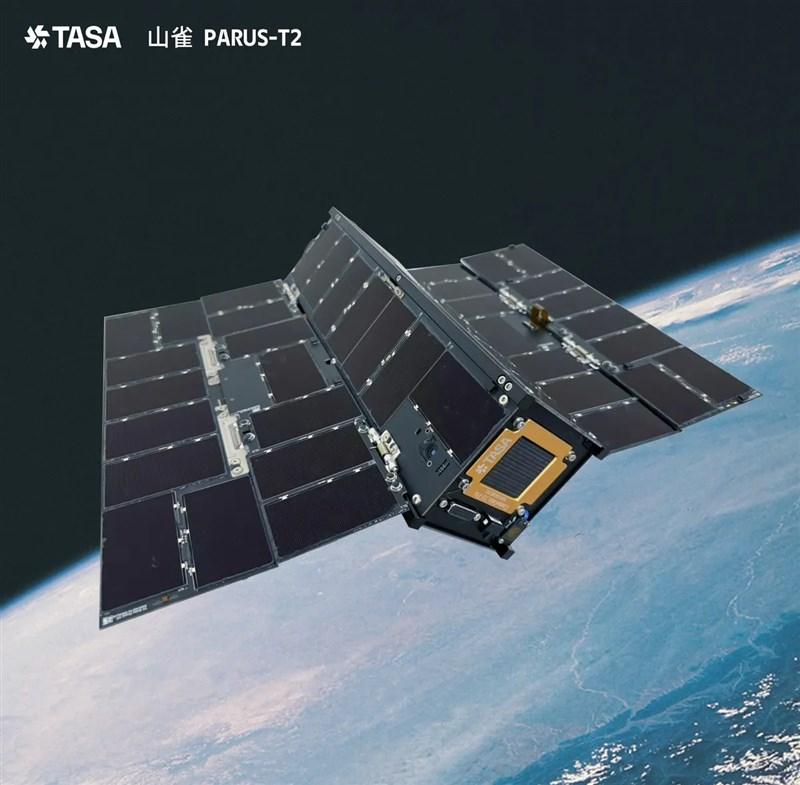A CubeSat designed and made by the Taiwan Space Agency (TASA) was yesterday launched into space from the Vandenberg Space Force Base in California, TASA said in a statement today.
The PARUS-T2, carried by a Space Exploration Technologies Corp (SpaceX) Transporter-14 rocket, was launched at 2:25pm California time and positioned in low-earth orbit at an altitude of 621km about 136 minutes after that, TASA said.
It connected with an overseas earth station two hours after positioning in orbit and was expected to connect with Taiwan's earth station at 10pm today, TASA said.

Photo courtesy of the Taiwan Space Agency via CNA
A cube satellite, or CubeSat, is a miniaturized satellite made up of multiple cubic modules of about 10cm³.
The PARUS-T2, a CubeSat measuring 30cm by 10cm by 10cm, is based on the PARUS-T1, which was sent into orbit on Jan. 15, but improvements were made to its satellite computer, power control system, satellite battery and global navigation satellite system receiver.
It has a new deployment mechanism to unfold its solar panel and is equipped with an altitude determination and control system developed by Taiwanese company Tensor Tech, TASA said.
It also carries a communication payload and an automatic packet reporting system payload, both made in Taiwan, the agency said.
The primary 12-month mission is to verify the satellite's performance, with the goal of improving the reliability of CubeSats developed by TASA, it said.
Once their reliability is confirmed, TASA hopes to develop a stable supply of CubeSats for commercial and academic use, ultimately boosting Taiwan's global competitiveness in the space industry, the agency said.
The PARUS project was named after Taiwan's indigenous Sittiparus castaneoventris, or chestnut-bellied tit, with the hope that domestically made satellites would fly high into the sky, TASA said.
The next PARUS CubeSat, PARUS-6U1, is expected to be launched in October carried by a SpaceX Transporter-15 rocket, it added.

US President Donald Trump said "it’s up to" Chinese President Xi Jinping (習近平) what China does on Taiwan, but that he would be "very unhappy" with a change in the "status quo," the New York Times said in an interview published yesterday. Xi "considers it to be a part of China, and that’s up to him what he’s going to be doing," Trump told the newspaper on Wednesday. "But I’ve expressed to him that I would be very unhappy if he did that, and I don’t think he’ll do that," he added. "I hope he doesn’t do that." Trump made the comments in

NOT AN OPENING: Trump’s violation of international law does not affect China’s consideration in attacking Taiwan; Beijing lacks capability, not precedent, an official said Taiwanese officials see the US’ capture of the president of Venezuela as a powerful deterrent to Beijing’s aggression and a timely reminder of the US’ ability to defeat militaries equipped with Chinese-made weapons. The strikes that toppled Venezuelan President Nicolas Maduro signaled to authoritarian leaders, including Chinese President Xi Jinping (習近平), US President Donald Trump’s willingness to use military might for international affairs core to US interests, one senior official in Taipei’s security circle said. That reassured Taiwan, the person said. Taipei has also dismissed the idea that Trump’s apparent violation of international law could embolden Beijing, said the official, who was not

A cold surge advisory was today issued for 18 cities and counties across Taiwan, with temperatures of below 10°C forecast during the day and into tonight, the Central Weather Administration (CWA) said. New Taipei City, Taipei, Taoyuan and Hsinchu, Miaoli and Yilan counties are expected to experience sustained temperatures of 10°C or lower, the CWA said. Temperatures are likely to temporarily drop below 10°C in most other areas, except Taitung, Pingtung, Penghu and Lienchiang (Matsu) counties, CWA data showed. The cold weather is being caused by a strong continental cold air mass, combined with radiative cooling, a process in which heat escapes from

Snow this morning fell on Alishan for the first time in seven years, as a strong continental cold air mass sent temperatures plunging across Taiwan, the Central Weather Administration (CWA) said. The Alishan weather station, located at an elevation of about 2,200m in central Taiwan, recorded snowfall from 8:55am to 9:15am, when the temperature dropped to about 1°C, the CWA said. With increased moisture and low temperatures in the high-altitude Alishan area, the conditions were favorable for snow, CWA forecaster Tsai Yi-chi (蔡伊其) said. The last time snow fell at the Alishan weather station was on Jan. 10, 2018, while graupel fell there